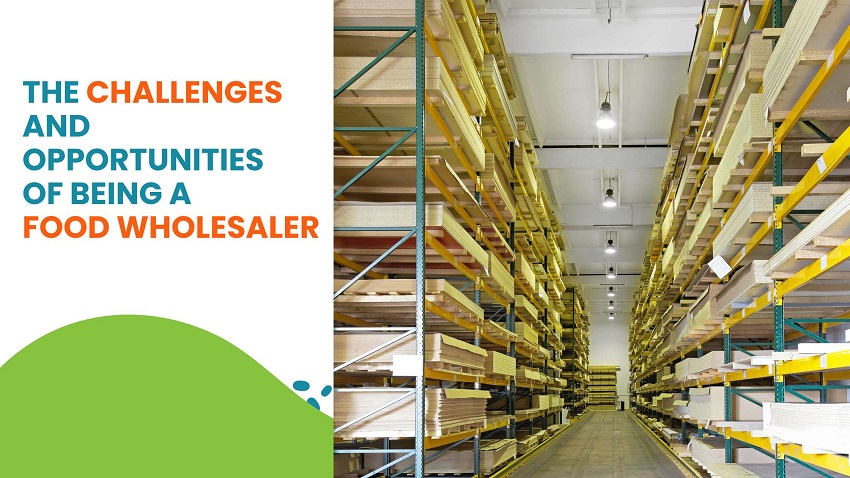In today’s world, food wholesalers face several challenges and opportunities. The market is changing rapidly, and many new trends are impacting how consumers buy food products. For example, the economy has slowed down due to increased competition on all fronts including online shopping platforms. As a result, consumers now have more choices when it comes to where they shop for groceries than ever before; moreover, they can easily access information about products through social media sites such as Facebook or Twitter with just a few clicks away!
This trend also affects how traditional wholesalers operate because they must adapt their business models to meet these changing needs while remaining competitive within existing marketplaces.
Top 10 Challenges and Opportunities of being a Food Wholesaler
Becoming a food wholesaler can be a great way for you to grow your business. It will allow you to sell your products to a larger group of people, which means more potential customers and higher profit margins.
As a food wholesaler, it’s important to understand the challenges you face to stay competitive and successful. Here are some of the most common challenges, and how you can deal with them.
1. Inventory Management
Food wholesalers need to be organized and efficient in their inventory management. This includes knowing what products they have on hand and when they’re going to run out, as well as making sure that all orders are filled promptly without running into storage issues. If you don’t keep up with your inventory or don’t have enough space for it, then your business will suffer.
2. Food Safety Regulation
Food wholesalers must adhere to a variety of regulations, including food safety and labeling laws, to ensure the safety and quality of their products.
3. Low Profit Margin
The challenges of being a food wholesaler are low-profit margins. The good news is that there are plenty of ways for you to increase revenue through sales, marketing, and other means.
4. Price Fluctuations
Price fluctuations refer to the changes in the price of food products over time. These fluctuations can be caused by a variety of factors, including:
- Weather: Extreme weather events, such as droughts, floods, and frost, can disrupt crop production and lead to price increases.
- Economic conditions: Economic downturns or instability can affect the demand for certain products and impact prices.
- Supply and demand: If there is a high demand for a particular product but a limited supply, prices may rise. Conversely, if there is an excess of a product and not enough demand, prices may fall.
- Transportation costs: The cost of transporting goods can impact the price of food products, especially for products that must be shipped over long distances.
- Government policies: Government policies, such as tariffs or subsidies, can affect the price of food products.
Food wholesalers must be able to adapt to these price fluctuations in order to remain competitive and ensure that they are able to offer products at a price that is attractive to customers. This may involve adjusting their purchasing and pricing strategies, as well as finding ways to minimize the impact of price fluctuations on their operations.
5. Supply Chain Management
Managing the supply chain, including sourcing and purchasing products, storing and distributing goods, and managing inventory, can be a complex and time-consuming task.
6. Competition
If you’re a food wholesaler, it’s important to understand that new entrants can be a threat to your business. You need to be prepared for them and know how to compete with them. It’s also important that you can adapt quickly if there are changes in the market or technology.
The key here is being prepared for change so that when something happens, your business doesn’t get hurt as much as others who weren’t ready or didn’t have adequate resources available at hand (which would likely lead them into bankruptcy).
7. Efficiency and Flexibility
A challenge for a food wholesaler is that they have to be able to handle all aspects of the business, from planning and buying to delivery, as well as keeping track of stock levels and costs. They need to be able to deal with unexpected situations quickly, so they can make the best use of their time.
As an opportunity for food wholesalers, they can take advantage of emerging trends and new technology to create new markets for themselves.
8. Marketing and Sales
Marketing and sales efforts are crucial to attracting new customers and retaining existing ones in a competitive industry.
9. Transportation and Logistics
Some challenges that food wholesalers may face in regards to transportation and logistics include:
- Finding reliable transportation providers: It is important to work with reputable and reliable transportation companies to ensure timely delivery of goods.
- Managing costs: Transportation and logistics can be a significant cost for food wholesalers, and finding ways to minimize these costs is important.
- Ensuring the safety and quality of goods: Food products must be handled and stored properly to maintain their safety and quality. This can be a challenge when transporting goods over long distances or through different climates.
- Dealing with delays and other issues: Transportation and logistics can be disrupted by a variety of factors, including weather, traffic, and equipment failures. It is important for food wholesalers to have contingency plans in place to minimize the impact of these disruptions.
- Staying up to date with industry regulations: There are various regulations that govern the transportation and storage of food products, and it is important for food wholesalers to be aware of and comply with these regulations.
10. Sustainability
As consumers become more environmentally conscious, food wholesalers may face pressure to adopt sustainable practices, such as using eco-friendly packaging and reducing food waste.
Conclusion
As you can see, many factors affect the food wholesaling industry. With these challenges in mind, it’s wise to prepare yourself for them and make sure your business is as successful as possible.
Overall, being a food wholesaler can be a challenging but rewarding career. It requires a deep understanding of the food industry, strong management skills, and the ability to adapt to a constantly changing market. However, with the right approach and a focus on providing high-quality products, food wholesalers can capitalize on the many opportunities available in this dynamic and growing industry.





